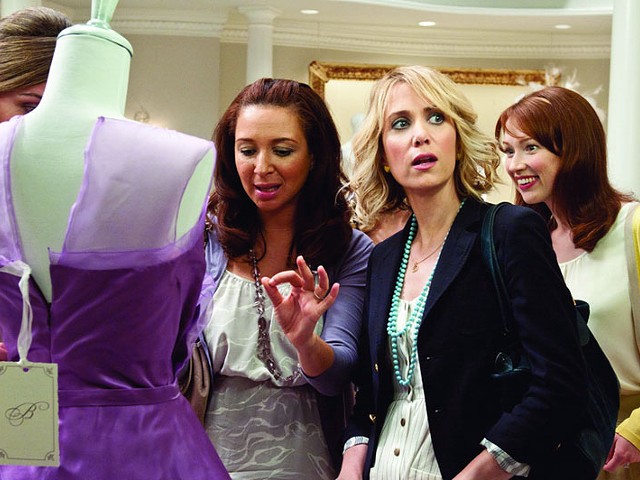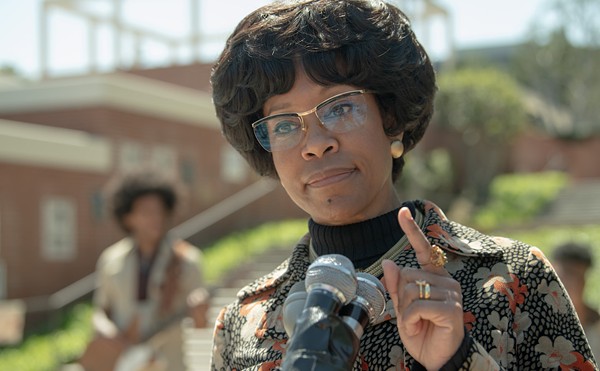An earnest, intermittently droll dramedy about a manic-depressive toy manufacturer and his bewildered family, The Beaver is a parable that's not easily parsed. While director Jodie Foster fails to maintain a consistent tone — could there be such a thing as inspirational satire? — the movie's lopsided wobble is undeniably enhanced by her star Mel Gibson — or at least by the baggage he schleps into the proceedings.
Walter Black (Gibson) is first seen floating in the chlorinated limbo of his backyard swimming pool; barely able to formulate a sentence, he's been diagnosed as "hopelessly depressed" and, once his exasperated wife (Foster) kicks him out of their Westchester digs, he's ineptly suicidal. As Walter trembles, drunk and disconsolate, on the ledge of his motel roof, the movie's mysterious Cockney-accented voiceover (a ruder version of the gecko that sells insurance on TV) is revealed to be that of Walter's manic self — a ratty hand-puppet discovered in a dumpster that, once it starts talking to him, offers him a means to reinvent himself back into the world.
There's no attempt to make it seem that Walter can throw his voice; on the contrary, the camera tends to focus on Gibson's lips flapping as he brandishes the puppet he's dubbed The Beaver. Still, Kyle Killen's script, a highly regarded property long thought impossible to produce, elaborates on the ventriloquism theme with a subplot involving Walter's eldest son, Porter (Anton Yelchin); busy as a beaver furnishing term papers to order, this Ivy League–bound high school senior is hired by the school's smartest girl (Jennifer Lawrence) to ghostwrite her valedictorian address.
Speaking through, even as he hides behind, his furry friend, Walter returns home. His younger son is delighted; his wife gets with the program once The Beaver explains that he's been prescribed by a shrink. Walter jogs and showers with the puppet; he also uses it to address his employees, inspiring them to mass-produce something called the "Mr. Beaver Wood-Cutting Kit." The puppet is even there for the movie's kinkiest (and most inadvertently funny) scene, as Gibson enacts some hot conjugal sex with the movie's perpetually harried-looking director.
Gibson gives Walter's manic jag suggestive verisimilitude — particularly after the wood-cutting kit becomes a runaway hit and he takes to the airwaves, appearing with the Beav on Good Morning America, riffing with Jon Stewart and interviewed by Terry Gross, who wonders why he needs his prop for a radio show. There's no way that Jim Carrey or Steve Carell, each formerly attached to the project, could have supplied this frisson. Gibson may be no one's idea of a method actor, but his pleasure playing nut-jobs, most apparent in the comic thriller Conspiracy Theory, seems weirdly confessional. (His more celebrated predilection — being beaten up onscreen — is also present, at the hand [sic] of The Beaver.)
Shot in autumn 2009, The Beaver was shelved when the monster from the Gibson id erupted last summer with revelations that he was verbally and physically abusing his girlfriend, and it has returned as something like a celluloid explanation. (Gibson pleaded no contest to a battering charge a week before the movie had its world premiere at SXSW.) Thanks to this lurid prequel, The Beaver manages to be both exploitative and humanizing; thanks to Gibson's convincing conviction, it goes surprisingly deep into madness before resolving itself in a nimbus of New Age platitudes.
Foster might have treated the material as an E.T.A. Hoffmann tale of demonic possession or a believe-it-or-not Oliver Sacks case history, with the puppet functioning as Walter's transitional object. Instead, she takes it at face value. Is The Beaver an allegory on acting? Directing? It's tempting to imagine Foster herself talking through the increasingly nasty puppet; the movies this former child-star has directed or produced have been notably interested in unique prodigies with unusual ways of communicating.
In Little Man Tate, Foster directed herself as the mother of an immaculately conceived kid genius; in Nell, Foster herself was the genius, a backwoods wild child with an invented language. She takes the maternal role in The Beaver — allowing Gibson the fun of babbling on like a hyperactive eight-year-old — but she clearly identifies, having cited her own struggle with depression in flacking the movie. Perhaps that's the problem. Mel's character isn't on Prozac, but the movie is — a succession of bland camera setups, cued to a highly conventional score. Would that the direction were half as nutty as the script or as wacked-out as its star!





